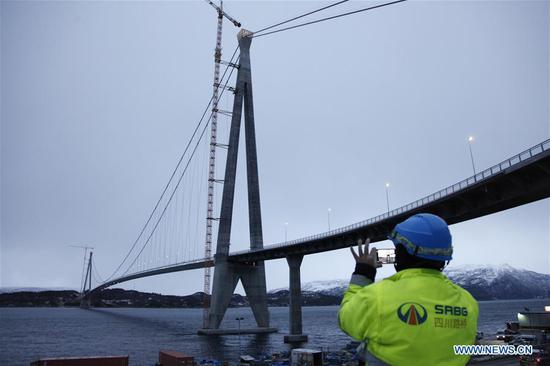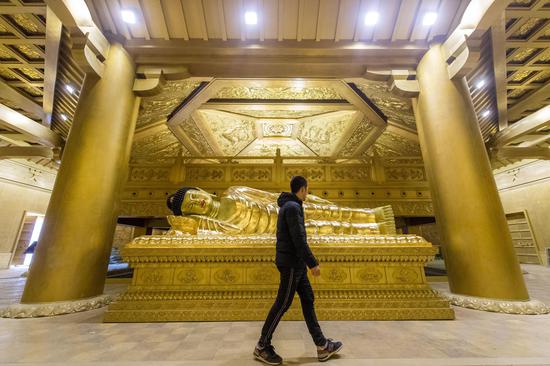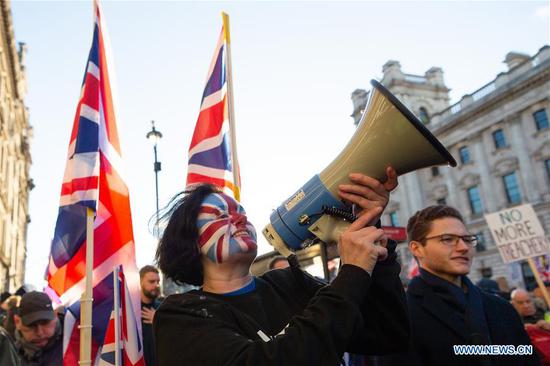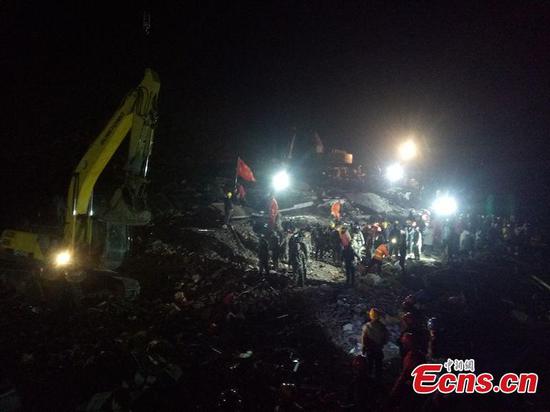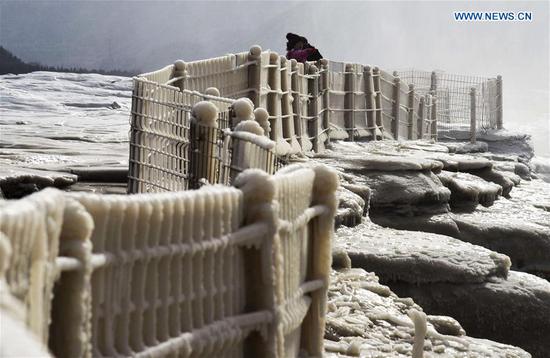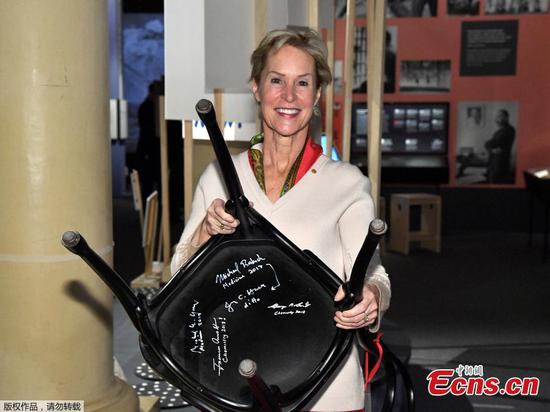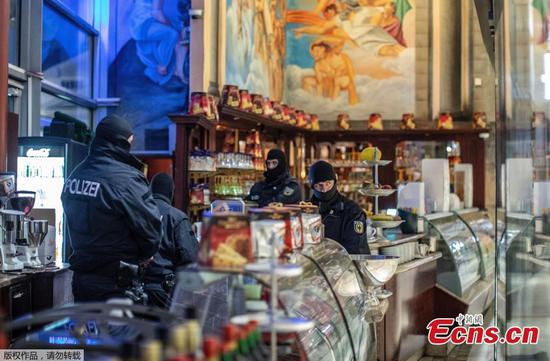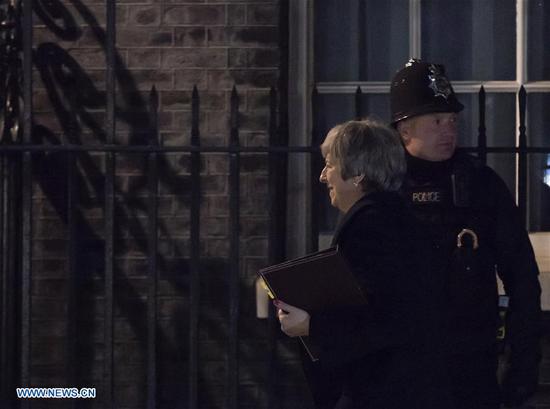
British Prime Minister Theresa May (Front) arrives at 10 Downing Street after making a statement in the House of Commons, in London, Britain, Dec. 10, 2018. Theresa May on Monday put brakes on the crunch vote on her Brexit deal in parliament in order to buy more time for further talks with European Union leaders, who claimed that the deal, reached last month, is not negotiable. (Xinhua/Han Yan)
British Prime Minister Theresa May on Monday put brakes on the crunch vote on her Brexit deal in parliament at the 11th hour in order to buy more time for further talks with European Union leaders, who claimed that the deal, reached last month, is not negotiable.
The prime minister told a hostile House of Commons that she made the decision after acknowledging "the deal would be rejected by a significant margin."
VOTE DELAYED
"We will therefore defer the vote scheduled tomorrow," May said.
She said that the Northern Ireland "backstop" is still a "widespread and deep concern" among MPs over the much criticized Brexit agreement.
"There is still a majority to be won in parliament with additional reassurance on backstop," she said.
Even before May confirmed the decision, the pound fell to an 18-month low.
Just hours after 10 Downing Street insisted the vote would go ahead Tuesday night as planned, May addressed MPs in the House of Commons to tell them of their change of plan.
May is under intense pressure from aides and senior ministers to consider putting off the Tuesday vote, a move Downing Street has emphatically denied will happen, after opposition and rebel MPs have vowed to vote against her Brexit deal
May is expected to tour European capitals starting Tuesday, the original date for the parliamentary vote, as she is fighting to save her Brexit deal, and possibly her premiership.
The Brexit deal -- the withdrawal agreement and political declaration -- was reached last month by London and Brussels after months of painful negotiations, it needs to be approved by the British parliament.
In response, May's critics rounded on her on Monday evening, with Eurosceptic Tory MP Jacob Rees-Mogg saying the likelihood of a no-deal Brexit had now increased.
"The government has lost control of Brexit" after it was found last week in contempt of the parliament, Jeremy Corbyn, the opposition Labour leader, said, adding that government was "shambolic" and in "disarray" over the Brexit talks and timings.
Meanwhile, some of MPs took the floor to criticize the prime minister for "wasting crucial time" over Brexit, which has a deadline of March 29, 2019.
NOT RENEGOTIABLE
May is now expected travel to Europe to seek reassurances over the Northern Ireland backstop.
In Brussels on Monday, European Council President Donald Tusk said he had called a meeting of the council to discuss Brexit on Thursday and that the European Union "will not renegotiate the deal including the backstop but is ready to discuss how to facilitate UK ratification".
The EU leaders are scheduled to meet as the final summit of the year is to be held Thursday and Friday.
Corbyn said that if May "cannot be clear that she can and will renegotiate a deal then she must make way."
Labour will table a motion of no confidence in the government "when we judge it most likely to be successful," he said.
Vince Cable, the leader of Britain's pro-EU Union Liberal Democrats, said that his party will support a vote of no confidence in the prime minister if the Labour Party called for one.
"With the fiasco today, the government has really lost all authority," Cable said. "I and my colleagues will fully support the leader of the opposition if he now proceeds to a no confidence vote as duty surely calls."
May said that she would also be "looking closely at new ways of empowering the House of Commons to ensure that any provision for a backstop has democratic legitimacy."
She wants to enable MPs to place obligations on the government "to ensure that the backstop cannot be in place indefinitely."
The prime minister said that she will continue talks with the European Union (EU) leaders after the Brexit vote is delayed, but insisted that her deal honors result of the 2016 referendum.
She said that there will be no successful Brexit without compromise on both sides.
Michael Gove, the British environment secretary, insisted on Monday that "of course, we can improve this deal and the prime minister is seeking to improve this deal."
However, Gove was contradicted by Simon Coveney, the foreign minister of Ireland, who said, "The deal ... is not going to change. Particularly the legal language of the withdrawal treaty."
For his part, Irish Prime Minister Leo Baradkar said in a statement on Monday that the European Union should step up the preparations for a no-deal Brexit.
In an emergency judgement delivered Monday just 36 hours before the expected British parliamentary vote, the Court of Justice, the European Union's top court, ruled that the British government may reverse its decision to leave the regional bloc without consulting other EU member states.
NATIONAL CRISIS
In response to the prime minister's confirmation that the parliament vote is delayed, two of Britain's leading business organisations on Monday described her decision as a blow to the country's industry.
Carolyn Fairbairn, director general of the Confederation of British Industry (CBI), said, "This is yet another blow for companies desperate for clarity."
"Investment plans have been paused for two and a half years," she said. "Unless a deal is agreed quickly, the country risks sliding towards a national crisis."
"Politicians on both sides of the Channel need to show leadership, by building consensus to protect both the UK and EU's prosperity," Fairbairn said. "No one can afford to head into Christmas with the threat of no-deal costing jobs and hitting living standards."
At the same time, Adam Marshall, director general of the British Chambers of Commerce, said avoiding a messy departure from the European Union is a matter of national urgency.
"Firms are looking on with utter dismay at the ongoing saga in Westminster, and express concern that politicians are seemingly acting in their own interest, with little regard for the millions of people whose livelihoods depend on the success of UK business and trade," Marshall said.
"Many business leaders will be intensely frustrated by yet another delay in this drawn-out process, which impacts real-world business conditions, not least currency markets," he added.











